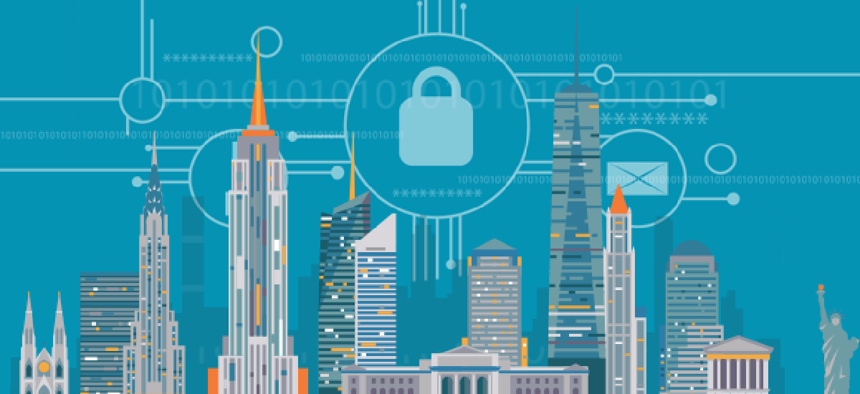NYC launches full-court cyber press


Connecting state and local government leaders
A multipronged effort aims to secure the city by investing in cybersecurity technology, entrepreneurs, a skilled workforce and empowering residents to better protect themselves against threats.
New York City is taking several steps to grow its own cybersecurity resources.
On Oct. 2, the NYC Economic Development Council (NYCEDC) announced plans to cultivate its cybersecurity sector with the Cyber NYC initiative. That effort will include a Global Cyber Center, an innovation hub for startups, initiatives to fuel commercialization and research, and new cybersecurity talent pipelines.
Aiming to address the cybersecurity needs of New York's signature industries -- finance, healthcare, retail and media – Cyber NYC also plans "catalyze" the growth of 10,000 cybersecurity jobs over the next decade, according to NYCEDC officials.
Cyber NYC is powered by a $30 million city investment and will leverage up to an additional $70 million from private funding from companies including Goldman Sachs, PricewaterhouseCoopers, MasterCard and Facebook.
The initiative includes the following efforts:
A 15,000-square-foot Global Cyber Center will offer a cyber range, a virtual testing ground to run simulations and coworking space for startups. Developed by Israeli corporate innovation expert SOSA, the center will also offer structured programming for companies and industry-specific events to encourage investments, commercialization and implementation of cyber technologies in NYC’s leading corporations.
NYCEDC tapped international venture capital firm Jerusalem Venture Partners to establish Hub.NYC, an international cybersecurity investment hub to support growth-stage startups and facilitate their access to clients. It will also offer business support and investment, with the objective of growing startups into major, NYC-based cybersecurity firms.
Columbia University's Inventors to Founders program will connect academic cybersecurity researchers with experienced entrepreneurial talent to commercialize the technology and launch new cybersecurity companies through mentorship, training and validation capital.
For the Applied Learning Initiative, the City University of New York, New York University, Columbia, Cornell Tech, and iQ4, a cloud-based virtual collaboration platform provider, will build a cyber talent pipeline. The partners will offer city residents certification and degree programs and provide degree-seeking students with real-world, case-method education about cybersecurity and facilitate job placements.
Fullstack Academy, a software development school, and CUNY’s LaGuardia Community College will develop a Cyber Boot Camp to prepare New Yorkers for cybersecurity jobs.
"Today's cybersecurity environment is more intricate and complex than ever before, and presents itself to companies, organizations and individuals alike," said Sean Joyce, cybersecurity and privacy leader at PricewaterhouseCoopers, one of the Cyber NYC partners. "To combat this ever-evolving threat landscape, it's important that we invest in developing skilled professionals, innovative approaches, and build collaboration across the public and private sector to thwart potential attacks and build stronger resiliency."
Mobile cybersecurity for city residents
To help NYC residents better protect themselves from mobile cyber threats, the NYC Cyber Command launched a free app that alerts mobile users to threats on their iOS or Android devices or on the Wi-Fi networks they are accessing.
The New York City-funded NYC Secure mobile app warns users about threats on their mobile devices, such as unsafe apps, a potentially unsecure Wi-Fi network or unsafe settings and activity. It can detect elevation-of-privileges attacks, rogue access points, and unenabled encryption. After identifying potential issues, NYC Secure offers recommendations on how to address the threats. The app does not require an internet connection to detect a threat, so alerts are immediate.
Neither the city nor the app's developer, Zimperium, collect or use any personal information.
The app was first announced in March as a part of Mayor Bill de Blasio’s larger NYC Secure initiative, aimed at protecting New Yorkers online that also included securing the city's public Wi-Fi networks. The Quad9 automated security platform the city deployed blocks access to known malicious sites by checking IP addresses against IBM X-Force threat intelligence, which includes daily monitoring of more than 40 billion web pages and images and 17 million spam and phishing attacks.
NYC Cyber Command mandated the deployment of the technology on the city's internal networks by the end of 2018. It will also be deployed on the LinkNYC network, whose 1,400 kiosks offer free high-speed Wi-Fi around the city's five boroughs.





